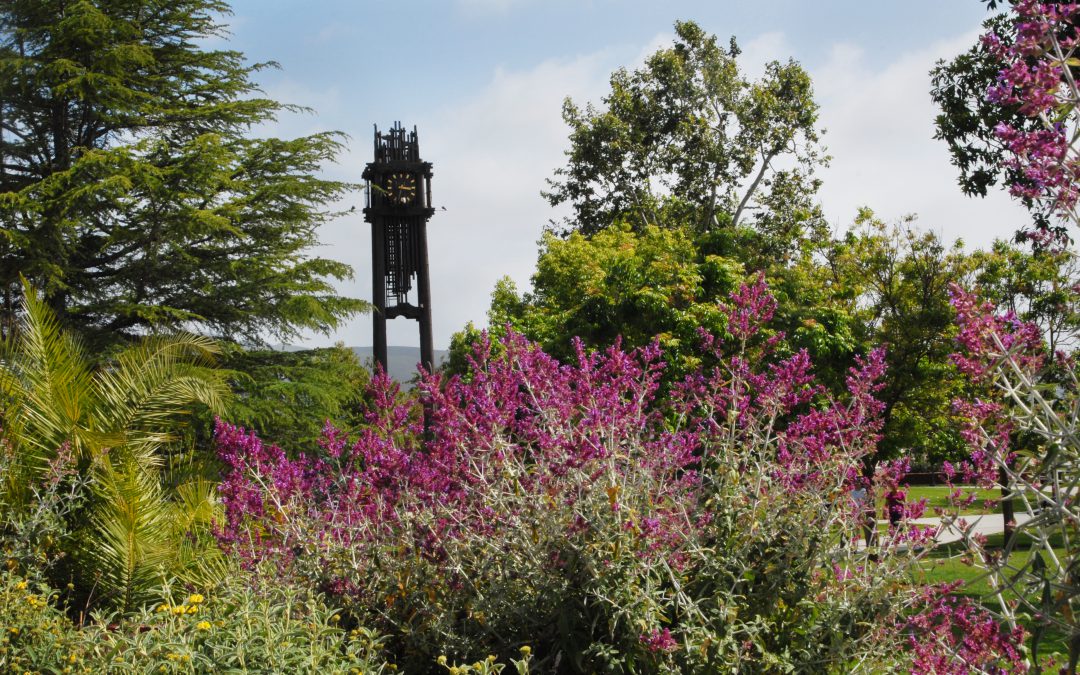Palomar is the only Community College in the State with this Distinction
SAN MARCOS – As Palomar College celebrates its 70th year, many would agree that the grounds of the San Marcos campus have never looked better. That impression was validated recently with the naming of the campus as a Level II Arboretum by The ArbNet Arboretum Accreditation Program. In California, Palomar is the only community college in California with this distinction, and along with UC Davis, one of only two college campuses in the state that are certified as Arboretums.
“The fact that the entire campus is recognized as an Arboretum, not only the Edwin and Francis Hunter Arboretum located on the northeast side of Palomar, is very exciting,” said Dr. Joi Lin Blake, Palomar College Superintendent/President. “This is a notable distinction that places Palomar as a leader in the county.”
The requirements for ArbNet’s Level II accreditation include having an up-to-date database with a minimum of 100 woody plants. Palomar now has more than 300 plants labeled. In addition, the accreditation requires that a plant collection policy must be in place and collections defined. Palomar’s roughly 200-acre campus currently houses 31 different garden themes, plus the Endangered Coastal Sage Brush community and the Edwin and Francis Hunter Arboretum. Some examples of the garden themes are as follows: a Hardwood Garden located near the Cabinet and Furniture Technology building displays trees often used in furniture and cabinet making; a Polynesian Garden near the Teaching and Learning Center is home to a faux lava field and rainwater-filled water feature; a Cactus and Succulent Garden near Mission Road and Comet Circle features more than 3,000 species; plus many California Native Gardens and other gardens that are scattered throughout the campus.
According to Tony Rangel, Palomar’s Grounds Services Supervisor, “Arguably Palomar College has one of the greatest concentrations of plant diversity on public display within a relatively small area in San Diego County, rivaled only by Balboa Park, the San Diego Zoo and Safari Park and San Diego Botanical Garden. Including the native coastal sage scrub north and east of campus, there are 3000-5,000 species spread throughout the campus property.”
Rangel, who is a certified arborist with the International Society of Arboriculture, said that Palomar’s arboretum certification contributes to the College’s Vision, Learning for Success. Arboretums display trees, shrubs and other woody plants from various locales around of the globe. “They are essentially living museums that allow for plant-based learning. Labeling and cataloging plant collections provides the public an opportunity to understand plant origins and how they fits into the global biodiversity of plants and animals,” he said. At Palomar, the arboretum also offers workshops and classes on plant care, ecology and biology.
Rangel further stated, “The Arboretum certification allows the college to work more closely and efficiently on plant-based conservation and education projects with other like-minded institutions from across the country and the globe. The certification demonstrates that the plants on campus are more than landscaping — they are part of a classroom, teaching visitors about the importance of landscaping responsibly with non-invasive plants, native plants and plants adapted to our climate. As the campus grows and diversifies over the coming years, Palomar will continue to show that we recognize and are committed to treating our botanical gems as ambassadors for conservation.”
ArbNet is an interactive, collaborative, international community of arboreta. ArbNet facilitates the sharing of knowledge, experience, and other resources to help arboreta meet their institutional goals and works to raise professional standards through the ArbNet Arboretum Accreditation Program. The accreditation program, sponsored and coordinated by The Morton Arboretum in Lisle, Illinois in cooperation with American Public Gardens Association and Botanic Gardens Conservation International, is the only global initiative to officially recognize arboreta based on a set of professional standards. The program offers four levels of accreditation, recognizing arboreta of various degrees of development, capacity and professionalism. Standards include planning, governance, public access, programming and tree science, planting and conservation. More information is available at www.arbnet.org.
###
CONTACT:
Melinda Finn, Public Affairs Office, 760-744-1150, ext. 2365
Laura Gropen, Director, Public Affairs Office, 760-744-1150, ext. 2152
Tony Rangel, Grounds Supervisor, 760-744-1150, ext. 2133
Palomar College Accredited as Arboretum
ArbNet is an interactive, collaborative, international community of arboreta. ArbNet facilitates the sharing of knowledge, experience, and other resources to help arboreta meet their institutional goals and works to raise professional standards through the ArbNet Arboretum Accreditation Program. The accreditation program, sponsored and coordinated by The Morton Arboretum in Lisle, Illinois in cooperation with American Public Gardens Association and Botanic Gardens Conservation International, is the only global initiative to officially recognize arboreta based on a set of professional standards. The program offers four levels of accreditation, recognizing arboreta of various degrees of development, capacity and professionalism. Standards include planning, governance, public access, programming and tree science, planting and conservation. More information is available at www.arbnet.org.
###
CONTACT:
Melinda Finn, Public Affairs Office, 760-744-1150, ext. 2365
Laura Gropen, Director, Public Affairs Office, 760-744-1150, ext. 2152
Tony Rangel, Grounds Supervisor, 760-744-1150, ext. 2133

